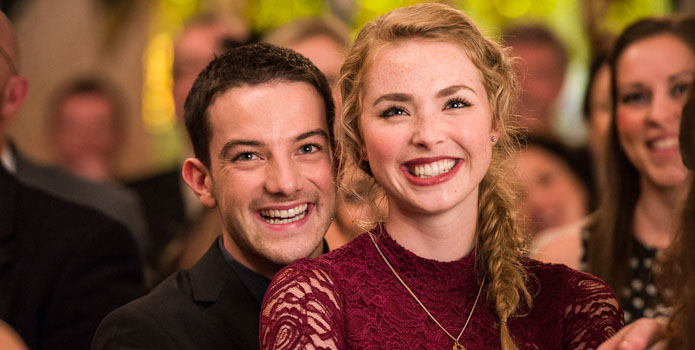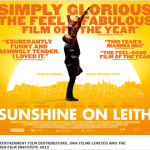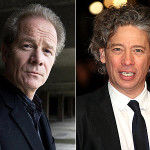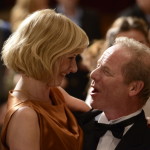Mark these words next time you’re wooing your potential life partner. They may come in handy:
When I wake up, well, I know I’m gonna be
I’m gonna be the man who wakes up next to you
When I go out, yeah, I know I’m gonna be
I’m gonna be the man who goes along with you
If I get drunk, well, I know I’m gonna be
I’m gonna be the man who gets drunk next to you
And if I haver, hey, I know I’m gonna be
I’m gonna be the man who’s havering to youBut I would walk five hundred miles
And I would walk five hundred more
Just to be the man who walked a thousand miles
To fall down at your doorWhen I’m working, yes, I know I’m gonna be
I’m gonna be the man who’s working hard for you
And when the money comes in for the work I do
I’ll pass almost every penny on to you
When I come home (When I come home), oh, I know I’m gonna be
I’m gonna be the man who comes back home to you
And if I grow old, well, I know I’m gonna be
I’m gonna be the man who’s growing old with youBut I would walk five hundred miles
And I would walk five hundred more
Just to be the man who walked a thousand miles
To fall down at your doorDa lat da (Da lat da), da lat da (Da lat da)
Da-da-da dun-diddle un-diddle un-diddle uh da-da
Da lat da (Da lat da), da lat da (Da lat da)
Da-da-da dun-diddle un-diddle un-diddle uh da-daWhen I’m lonely, well, I know I’m gonna be
I’m gonna be the man who’s lonely without you
And when I’m dreaming, well, I know I’m gonna dream
I’m gonna dream about the time when I’m with you
When I go out (When I go out), well, I know I’m gonna be
I’m gonna be the man who goes along with you
And when I come home (When I come home), yes, I know I’m gonna be
I’m gonna be the man who comes back home with you
I’m gonna be the man who’s coming home with youBut I would walk five hundred miles
And I would walk five hundred more
Just to be the man who walked a thousand miles
To fall down at your doorDa lat da (Da lat da), da lat da (Da lat da)
Da-da-da dun-diddle un-diddle un-diddle uh da-da
Da lat da (Da lat da), da lat da (Da lat da)
Da-da-da dun-diddle un-diddle un-diddle uh da-da
Da lat da (Da lat da), da lat da (Da lat da)
Da-da-da dun-diddle un-diddle un-diddle uh da-da
Da lat da (Da lat da), da lat da (Da lat da)
Da-da-da dun-diddle un-diddle un-diddle uh da-daAnd I would walk five hundred miles
And I would walk five hundred more
Just to be the man who walked a thousand miles
To fall down at your door
As a genre, I detest shows based on the music of an artist on stage or screen. You know what I mean – Mama Mia to showcase Abba songs, We Will Rock You as an excuse to sing Queen songs, Our House if your Madness takes you thus, and many others.
Why? They are utterly contrived and cynical exploitation vehicles. They lack integrity, being created in the sure knowledge that fans of the bands will be out in droves to watch, but generally having no artistic merit in their own right. They cheat the loyalty of the fans,in my humble opinion, but from the perspective of the record companies and the multimillionaire stars it’s merely a way to exploit further their catalogue and make still more money.
You would therefore expect me to think the same of Sunshine on Leith, Dexter Fletcher‘s musical movie based on Stephen Greenhorn‘s stage show featuring the songs of The Proclaimers, aka identical twins Craig and Charlie Reid (who in my estimation are almost certainly not multimillionaires, and remain true to their roots.)
Not so. The movie is a total breath of fresh air, and is everything the other movies are not. It is worth a hundred Mama Mias, and I will tell you why.
1) Dexter Fletcher’s direction
First thing to note is that this is Fletcher’s first movie as a director. Dexter Fletcher, you know – the cockney geezer in Lock, Stock & Two Smoking Barrels, the concierge in Hotel Babylon, the villain’s young assistant in Elephant Man, that bloke! While he is a Londoner through and through, Fletcher’s affinity with the Scottish landscape and people is evident from start to finish. He has an eye for this directing lark and has created from what must be a great stage show a movie with panache, one that is engaging and charming throughout, happy and sad, avoiding a panoply of cinematic clichés to give the movie as natural a feel as you can expect from a musical where people burst into song at a moment’s notice. All power to his elbow.
2) Stephen Greenhorn’s story, plot and script
Greenhorn’s writing has the coherence and integrity all others gloss over. With or without music it is a story well-told, a simple tale about the complications of relationships within and around one family: two squaddies returning from Afghanistan, one falling for the sister of the other, the other falling for her friend, and the mum and dad celebrating their silver wedding anniversary but confronting his secret past. It doesn’t need any greater complication than that, since the nature of human feelings and entanglements say it all. It is romantic without being soppy, and all the better for that.
Another thing: not all endings are happy, but it will charm the socks off you regardless. This seems to me a key distinction. To describe SOL as a “feel-good movie”, as many critics have done, is certainly true in part, but it does not tell the whole story. The story is bittersweet, it portrays the full range of emotions, and the fact that it is so rounded is why it succeeds. The endings vary between happy and sad, but then that’s what happens in real life.
Nevertheless, that the hard-bitten movie critic Mark Kermode joyfully admitted to having wept on at least three occasions in the movie, and awarded it the title of movie of the week says a lot; so I will admit to having blubbed throughout. This movie will now join my list of Movies That Made Me Cry – not by virtue of syrupy schmaltz but through the expedient of honest portrayal of emotions. Would that every movie could learn this lesson.
3) Characters and actors
The characters ring true, and the inclusion of non-actors like the young lad who has lost his legs while serving only add to the air of authenticity. Casting fine actors who can sing, like Peter Mullan and Jane Horrocks (who is Lancastrian rather than Scottish, but travels well), makes a difference, but the ensemble cast put in strong performance and sing better than Pierce Brosnan ever will.
Even Jason Flemyng (also of Lock, Stock fame) puts in a fine and unexpected turn of singing and dancing. You can tell the cast are all passionate about the show, they are giving their all and thoroughly enjoying it in the process. How often can you say that, given the number of stars who telephone in their performance nowadays?
So, not a bad performance to be seen – though the cameo by Craig and Charlie coming out of the pub at the start comes pretty close!
4) Edinburgh & home
The beautiful, beautiful way in which the city of Edinburgh becomes a character in its own right. Not just the castle either – the whole town, right the way through to the set piece finale dancing to the classic anthem 500 Miles (see above.) This is a movie very much of its terroir. It could not be transplanted to Minnesota or anywhere else. It is proudly a Scottish show with Scottish music, and all the better for that.
This is not accidental, since one of the themes of the script is unquestionably the power of home set against the lure of travelling away, be it to Afghanistan or Florida or England. Where will you go for love?
5) The music of The Proclaimers
This brings me on to the music. Where Abba, Madness, Queen and others have, by repetition, become hackneyed, many Craig and Charlie songs are fresh as a daisy. They are often touchingly romantic in an innocent, child-like way, but speak from the heart. Some have barely been aired but come out of this movie rediscovered as new anthems for a new generation.
Think that sounds over the top? The song Over And Done With was on the Proclaimers’ debut album in 1987. It didn’t even make their greatest hits collection, but in the context of the movie it is a show stopper – zesty, catchy, made for a musical. Here is the original, but in the film it is sung in the pub and brings the house down. Brilliant! In fact, in the movie it works better than the original.
All the songs come out of this redressing with added resonance and they will open quite a few eyes along the way – and awaken a lot of interest in The Proclaimers, for sure. They fit neatly into the plot without contrivance, possibly because they are at heart simple songs telling tales of love, basic emotions and their Scottish roots – stuff they know about, in other words.
Granted there is still the artificial device whereby characters suddenly burst forth into song in the course of a situation, aided by bands and orchestras presumably hidden in a closet somewhere behind the camera, but if you can put up with that level of artifice then the music is sheer joy. The songs articulate the passions of the players, and how else should a musical deliver?
***
OK then, there you have it: Andy’s surprise hit of the year, and further evidence if ever you needed it that a low-budget production with charm and intensity can deliver the goods better than any number of studio epics. It is the musical for people who don’t like musicals. Forget Mama Mia. I urge you to go see Sunshine on Leith, remember to take a box of tissues with you and don’t be ashamed of yourself!













i love this film and have watched it a few times, I also love Mama Mia, I just love to get lost in these sort of films ☺️☺️